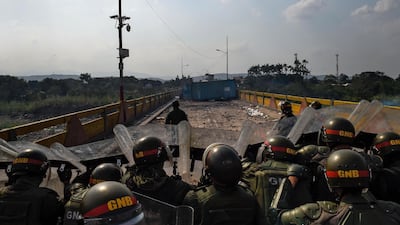US Vice President Mike Pence is expected to touch down in Colombia on Monday, following another deadly weekend in neighbouring Venezuela.
Mr Pence is scheduled to meet members of a regional coalition in Bogota as well as Venezuelan opposition leader Juan Guaido. Top of the agenda: how to remove President Nicolas Maduro.
The US and Venezuelan opposition are planning new ways to provide assistance, after efforts to deliver aid to the devastated country descended into chaos and violence on Saturday. Civilians trying to collect foodstuff and medical kits on the borders with Colombia and Brazil were reportedly targeted by forces loyal to President Maduro and his armed militias. Two protesters were killed along the Brazilian border and at least 300 were wounded.
According to Venezuelan human rights group Foro Penal, more than 12,500 people have been arrested since 2014 in connection with protests.
A senior US official said Mr Pence is expected to announce "clear actions" as he speaks to members of the Lima Group, a coalition of more than a dozen nations organised to address the crisis in Venezuela, the Associated Press reported.
"We are going to show the world and Maduro that the United States stands with the people of Venezuela and that the United States stands with Guaido," the official said, speaking on condition of anonymity to preview the speech in Bogota. "And we are going to continue to stand with him until democracy is restored and humanitarian aid gets to where it needs to go."
Venezuelans have faced severe shortages of medicine and food in recent years. In 2016, maternal mortality increased by 65 per cent and infant mortality by 30 per cent – as a result, the health minister was fired.
The UN high commissioner for human rights condemned the unfolding violence, calling on Sunday for the Venezuelan government to stop its forces from "using excessive force against unarmed protesters and ordinary citizens". The European Union also condemned Venezuela's use of violence and armed civilians to block the aid entry, while United Nations Secretary General Antonio Guterres said he was "shocked and saddened" by the civilian deaths.
The statements follow reports and images of forces loyal to President Maduro firing tear gas and buckshot at activists accompanying the supplies and setting the material on fire.
In a turn of events on Sunday, what was previously a handful of defectors from the Venezuelan security forces turned into more than 160, with one soldier telling Mr Guaido: "More are coming".
For weeks, the US had been amassing emergency food and medical kits on the Latin American country's borders in anticipation of carrying out a "humanitarian avalanche" by land and sea to undermine Venezuela's government.
Self-appointed President Mr Guaido has been recognised as interim leader by the US and 50 other governments and enjoys widespread support in a country ravaged by years of financial mismanagement. Julio Borges, the opposition ambassador to the Lima Group, on Sunday urged the use of force against Mr Maduro's government. But US officials have avoided talk of military action.
Republican Senator Marco Rubio of Florida, who visited the border last week and has President Donald Trump’s ear on policy toward Venezuela, tweeted out pictures of anti-American strongmen including Panama’s Manuel Noriega, Libya’s Muammar Qaddafi and Romania’s Nicolae Ceausescu at the height of their power and their brutal downfall – a not-so-subtle warning to Mr Maduro that social media users have called "blood-soaked murder threats".
While the country's political unrest shows no sign of abating, journalists are also confronted with risks. According to the Committee to Protect Journalists, Venezuelan authorities on January 23 raided at least three newsrooms in southern Venezuela, took at least one television outlet off air, detained two reporters, confiscated reporting equipment and forced members of the press to delete their material.
"For local journalists, the main risks are potential for physical harm while covering protests, as well as detention or prosecution at the hands of state security forces and authorities," the CPJ warned. "Military intelligence agents have detained journalists who were covering Guaido, and intelligence agents have raided or shut down several media outlets reporting on the crisis."

